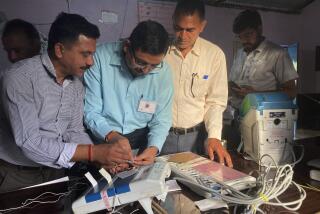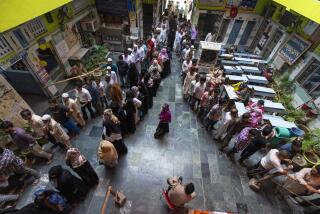Pakistan’s Ugly Campaign in Final Phase : Politics: Thousands of supporters welcome Bhutto in enemy territory. They outnumber opposition crowds.
- Share via
LAHORE, Pakistan — A bitter Pakistani election campaign widely seen as a referendum on ousted Prime Minister Benazir Bhutto entered its final phase here early today as tens of thousands of her supporters welcomed her into enemy territory.
Bhutto’s crowd far outnumbered that of a chief opponent, Nawaz Sharif, even though Pakistan’s second-largest city is his longtime power base and a key battleground in Wednesday’s election.
Provincial officials had refused to give Bhutto a rally permit. But crowds were so thick as she entered this historic city late Monday that she quit her slow-moving procession of honking cars and flag-waving supporters at 2 a.m., only part way down a planned parade route.
In contrast, only a few thousand people waved signs, cheered and blew whistles as Sharif led his own supporters to Mochi Gate, at the edge of the Mogul-era walled inner city, for a final rally and speech.
“ Inshallah, we shall win!” he shouted to reporters, as aides threw stacks of rupee notes to the crowds and fireworks lit the misty night sky.
By law, all campaigning must stop today. Pakistan’s 48.6 million voters go to the polls Wednesday to elect 217 members of the National Assembly in Islamabad.
The election gives the embattled 37-year-old Bhutto and her Pakistan People’s Party another chance at power 11 weeks after President Ghulam Ishaq Khan dismissed her 20-month-old government for alleged corruption, nepotism and abuse of power.
Bhutto’s chief opponents, Sharif, 41, and caretaker prime minister Ghulam Mustafa Jatoi, 59, joined together with orthodox Muslim groups in a fractious coalition of 19 parties united only in their goal of defeating the Islamic world’s lone woman leader.
“The opposition had difficulty getting together,” conceded Husain Haqqani, a spokesman for Jatoi. “There’s been a lot of internal conflict. And Benazir has taken advantage of that.”
By all accounts, Bhutto also benefited from the caretaker government’s increasingly clumsy attempts to prosecute her and her husband, Asif Ali Zardari, for alleged corruption.
Bhutto has been charged in six cases and potentially faces a seven-year ban from holding political office. Zardari, who is running for a parliamentary seat against Jatoi’s son, was granted bail Sunday after spending 11 days in a Karachi jail for alleged extortion and bank fraud.
“She has tried to turn this election into a referendum on herself and how she’s been persecuted, instead of how her government performed,” said Maleeha Lodhi, a political analyst in Islamabad. “That way she can rely on her charisma.”
Pakistan is America’s closest ally in the region. Relations grew strained after Bhutto’s abrupt dismissal, however, and Washington froze $564 million in promised economic and military aid over Pakistan’s apparent nuclear weapons development program.
Most analysts expect a lower turnout than the 43% who voted in 1988, the race that brought Bhutto to power and restored Pakistan’s democracy after 11 years of brutal martial law under Gen. Zia ul-Haq.
“The voter is indifferent now,” said Khalid Ahmed, editor of The Frontier Post in Lahore. “He doesn’t care--because nobody expects these elections to produce a government responsible to their needs.”
Political experts in Pakistan say neither party is likely to win a clear majority of National Assembly seats, making a weak coalition government the likely result.
One Western diplomat in Karachi said he expects Bhutto’s party to win fewer seats than in 1988. “If it exceeds 92, which it won last time, it will be seen as a triumph and vindication for Benazir,” he said.
Elections for the country’s four provincial assemblies will be held Oct. 27. More than 4,800 candidates, mostly independents, are running.
Election officials estimate that nearly $1 billion is being spent during the campaign, including a sudden surge of projects for road building, electricity and schools in hotly contested districts.
The national campaign has been marked by bitter name-calling and charges, with Bhutto and her opponents accusing each other of corruption, abuse of power and outright treason.
In some areas, the mudslinging was accompanied by arrests, kidnapings, reported murders and alleged vote buying and poll rigging. The army has announced it will assign 35,000 troops to patrol potential trouble spots in the Sindh, Bhutto’s home province.
“Pre-poll rigging has already started,” complained Shafqat Mahmood, a close Bhutto aide. He said opponents were buying voter identifications cards in Lahore’s slums for 500 rupees, about $23. “They assume anyone who is poor is for us,” he said.
“It’s dirty, dirty, nasty, nasty,” a prominent politician in Islamabad agreed. “That’s because politics is all local here, not national. Feudal families fight for the spoils among themselves. So they do whatever is necessary to win.”
An international delegation of 39 election observers will monitor voting and counting in selected areas. The group was organized by the National Democratic Institute in Washington and half the members are Americans.
More to Read
Sign up for Essential California
The most important California stories and recommendations in your inbox every morning.
You may occasionally receive promotional content from the Los Angeles Times.














